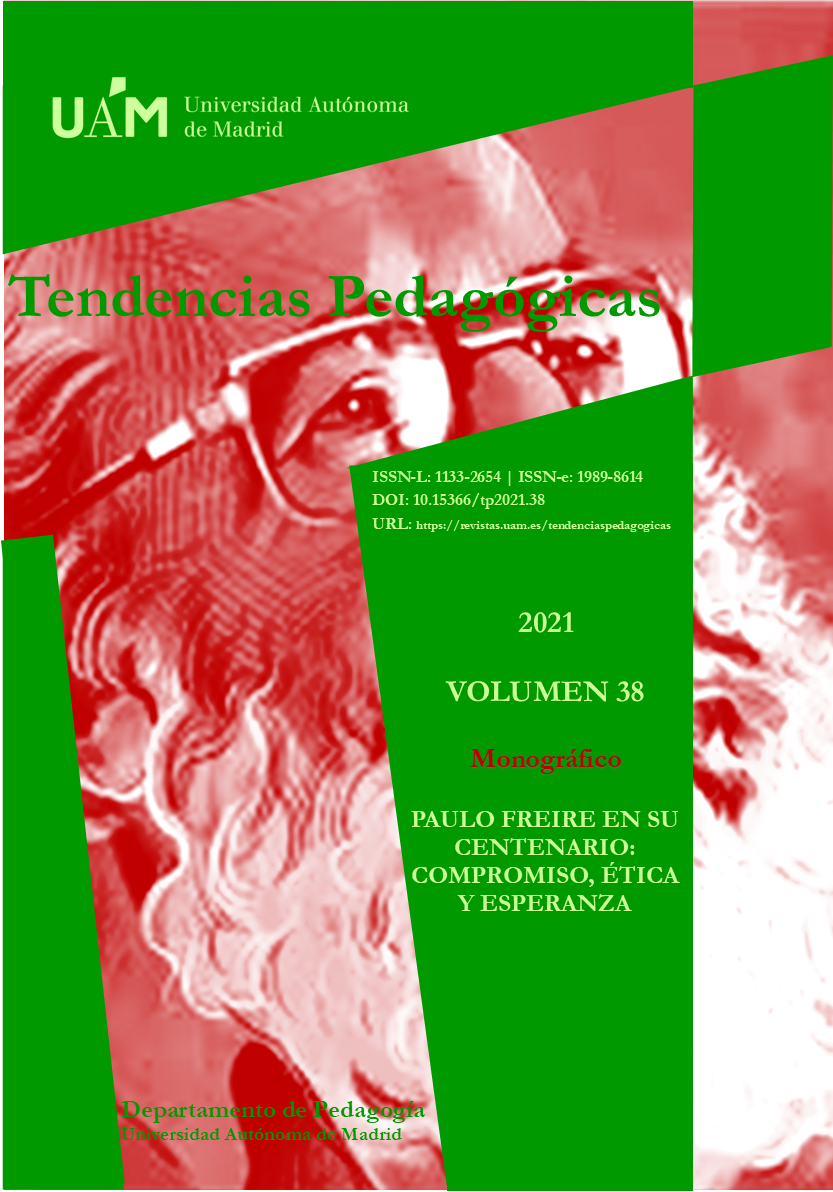Concientización y criticismo. Aportaciones de Raymond Williams y Paulo Freire a la educación de personas adultas
Palabras clave:
concientización, criticismo, cultura, emancipación, persona educadoraDerechos de autor 2021 Emilio Lucio-Villegas

Esta obra está bajo una licencia internacional Creative Commons Atribución-NoComercial 4.0.
Resumen
1921 marca el centenario del nacimiento de Paulo Freire, y también del pensador galés Raymond Williams. No consta que se conocieran, aunque quizás tuvieron alguna noticia de la obra respectiva. Vivieron en contextos radicalmente diferentes y con preocupaciones intelectuales también diferentes, pero el pensamiento de ambos presenta puntos en común muy interesantes: la importancia de la cultura, la insistencia en una educación de personas adultas que sea útil a la emancipación de las personas y las comunidades, la construcción de una sociedad democrática o el papel de las personas educadoras, entre otros. El artículo no pretende explorar posibles conexiones entre el pensamiento de estos dos autores, aunque ambos han tenido una influencia importante en la educación de personas adultas durante el siglo XX, que perdura a lo largo del XXI. Lo que pretendo en el texto es reflexionar sobre algunas de sus ideas que nos permitan resistir los embates del neoliberalismo presente en las políticas y las prácticas del aprendizaje a lo largo de la vida, y nos guíen en la senda de construir una sociedad y una educación más justas, solidarias y democráticas.
Descargas
Citas
Barreiro, J. (1986). Educación Popular y proceso de concientización. México, Siglo XXI.
Beltrán, J. (2004). Introducción. Nada es inevitable: un inventario de Raymond Williams para la larga revolución. In J. McIlroy & S. Westwood (Eds.). En la frontera. Raymond Williams en la educa-ción y formación de personas adultas (pp. 5-22). Barcelona: Diálogos.
Besalú, X. (2010). Pedagogía sin complejos. Barcelona: Diálogos.
Cole, J. (2008). Raymond Williams and education – a slow reach again for control. The encyclopedia of pedagogy and informal education. Recuperado el 12 de diciembre de 2020 de https://infed.org/mobi/raymond-williams-and-education-a-slow-reach-again-for-control/.
Dewey, J. ([1916] 1995). Democracia y Educación. Madrid: Morata.
Diaz Salazar, R. (1991). El proyecto de Gramsci. Barcelona: Anthropos.
Finger, M. y Asún, J. M. (2001). Adult Education at the Crossroad. Learning the Way Out. Leicester: NIACE.
Freire, P. (1984). La importancia de leer y el proceso de liberación. Madrid: Siglo XXI.
Freire, P. (1985). Pedagogía del Oprimido. Madrid: Siglo XXI.
Freire, P. (1986). La Educación como práctica de la libertad. Madrid: Siglo XXI.
Freire, P. (1990). La naturaleza política de la educación. Poder, educación y liberación. Barcelona: Paidós.
Freire, P. (1997). Professora sim, tía não. São Paulo: Olho dágua.
Gelpi, E. (2004). Trabajo Futuro. La formación como proyecto político. Xàtiva: Edicions del CREC.
Geertz, C. (1987). La interpretación de las culturas. Barcelona: Gedisa.
Gramsci, A. (1974). Antología. Madrid: Siglo XXI.
Hooks, B. (2003). Bell Hooks parla de Paulo Freire: l’home, l’obra. In P. McLaren & P. Leonard (Eds.), Paulo Freire. Un encontre crític. (pp. 193-202). Xàtiva: Edicions del CREC.
Inglis, T. (1997). Empowerment and Emancipation. Adult Education Quaterly, 48(1), pp. 3-18. doi: 10.1177/074171369704800102.
Kirkwood, G., & Kirkwood, C. (2007). Educación de personas adultas viva. Freire en Escocia. Barcelona: Diálogos.
McIlroy, J. (1993). Border Country: Raymond Williams in adult education. In J. McIlroy & S. Westwood (Eds.), Border Country. Raymond Williams in adult education. (pp. 269-323). Leicester: NIACE
Morgan, W. J. (1996). Antonio Gramsci and Raymond Williams: workers, intellectuals, and adult education. Convergence, XXIX(1), pp. 61-74.
Osowski, C. I. (2015). Cultura. In D. Streck, E. Redin & J. Zitkoski (Orgs.), Diccionario Paulo Freire (pp. 126-128). Buenos Aires: CLACSO.
Osowski, C. I. (2015). Cultura del Silencio. In D. Streck, E. Redin & J. Zitkoski (Orgs.), Diccionario Paulo Freire (pp. 129-131). Buenos Aires: CLACSO.
Smith, D. (2008). Raymond Williams. A warrior’s tale. Londres: Parthian.
Williams, R. (1959). The press and popular education. In J. McIlroy & S. Westwood (Eds.) (1993), Border Country. Raymond Williams in adult education. (pp. 121-126). Leicester: NIACE
Williams, R. (1960). Culture and Society. Londres: Chatto and Windus.
Williams, R. (1961). An open letter to WEA tutors. In J. McIlroy & S. Westwood (Eds.) (1993), Border Country. Raymond Williams in adult education. (pp. 222-224). Leicester: NIACE
Williams, R. (1977). Marxism and literature. Oxford: Oxford University Press.
Williams, R. (1965). The Long Revolution. Londres: Pelican Books.
Williams, R. (1985). Keywords. A vocabulary of Culture and Society. Nueva York: Oxford University Press
Williams, R. ([1960] 2013). Border country. Llandibïe: Library of Wales.
Woolf, V. ([1929] 2019). Um quarto que seja seu. Lisboa: Nova Vega.

